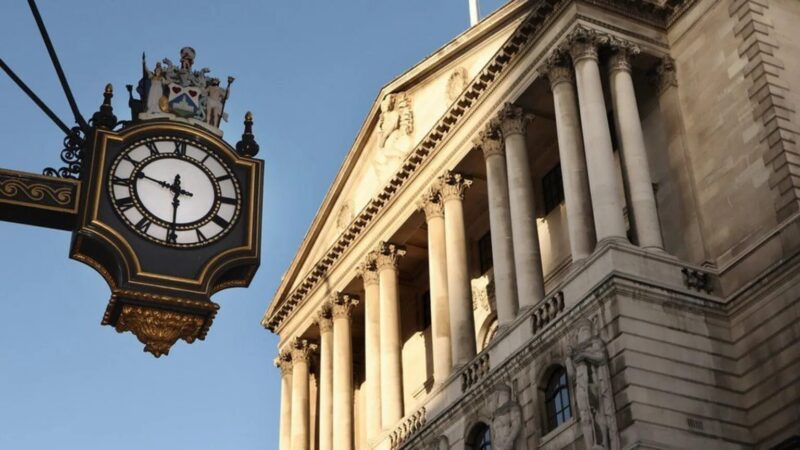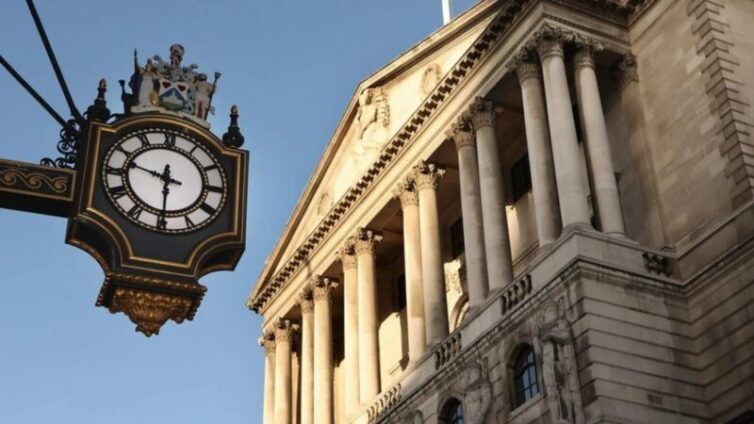Interest rates are expected to be held at 5% by the Bank of England on Thursday.
The decision at midday comes after it was revealed inflation, which measures the rate of UK consumer prices rising, remained at 2.2% last month.
The figure is just above the Bank's 2% target, but its governor Andrew Bailey has warned people not to expect a sharp fall in rates in the coming months.
Economists and investors are betting on rates to be left unchanged on Thursday and for the Bank to opt to cut them again in November instead.
Rob Wood, chief UK economist at economic research consultancy Pantheon Macroeconomics, said the inflation data released on Wednesday gave the Bank of England "little reason to rush to cut interest rates again" on Thursday.
"It still seems likely that they will decide to keep interest rates paused this month, and instead wait to cut rates again in November and December," added Susannah Streeter, head of money and markets, at investment firm Hargreaves Lansdown.
Interest rates dictate the cost of borrowing set by lenders for loans such as mortgages and credit cards - as well as the returns on savings.
While rates were cut for the first time since March 2020 last month, the cost of borrowing remains high, with homeowners on fixed-rate mortgages still facing the prospect of much higher repayments when deals expire over the next few years.
Mr Bailey has previously warned the Bank must "make sure inflation stays low and be careful not to cut interest rates too quickly or by too much".

The decision to cut rates in August was tight. Five of the Bank’s nine-member Monetary Policy Committee (MPC), voted for a quarter-point cut.
Allan Monks, UK economist at investment bank JP Morgan, said it expected the Bank to hold rates.
"The MPC is minded to ease cautiously and we look for the next cut in November," he added.
"The Bank has been turning more dovish lately, but requires more favourable data surprises to easing more quickly."
Rates have climbed in recent years as the Bank has tried to slow the pace of consumer price rises.
Prices started rising quickly as demand for goods increased when Covid lockdown restrictions were lifted. But energy and food prices then soared following Russia's invasion of Ukraine. This led to inflation peaking at 11.1% in October 2022 - the highest rate in 40 years.
The theory behind increasing interest rates to tackle inflation is that by making borrowing more expensive, more people will cut back on spending and that leads to demand for goods falling and price rises easing.
But it is a balancing act as high interest rates can harm the economy as businesses hold off on investing in production and jobs.
Latest Stories
-
Minority Chief Whip raises concerns over ambiguities in Gold Board bill
50 minutes -
Mahama warns leaders against ‘decisions that kill’ after debt crisis claims lives
51 minutes -
Wisconsin Attorney General sues to block Elon Musk $2m election giveaway
58 minutes -
Disney faces US investigation over DEI practices
1 hour -
Hair relaxers linked to increased breast cancer risk in Ghanaian women
1 hour -
Columbia University president resigns amid Trump crackdown
1 hour -
CJ removal petition: Citizens must not sit back and watch politicians to get their way – NPP MP
1 hour -
Thousands gather to bid farewell to ageless Ga music icon Naa Amanua Dodoo
2 hours -
From despair to hope: Khadijah Bawuma receives life-changing scholarship after Myjoyonline report
2 hours -
Mob kills seven suspected kidnappers in Nigeria’s Edo state
3 hours -
Joseph Paintsil to make injury comeback after six weeks out
3 hours -
14 arrested over missing ECG containers at port
3 hours -
Energy Minister demands forensic audit over missing ECG containers
3 hours -
Joseph Paintsil unveils debut EP ‘Emergency’, set for April 4
3 hours -
Petition to remove CJ is not politically motivated – Adawuda
4 hours

